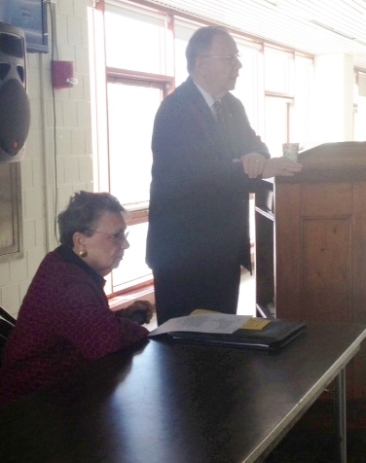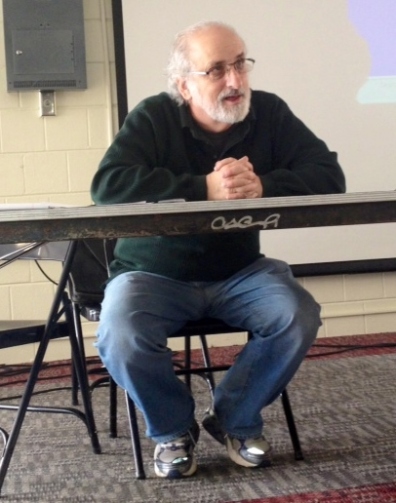^ seeking answers to the challenge that charter schools pose to standard public schools : at the Citizens for Public Schools Forum
—- —- —– —–
For those who believe that competition among educational systems and methods is preferable to one-size-fits-all, the Forum held this morning by Citizens for Public Schools at Madison park High School made for painful listening. For three hours non-stop, two panels of speakers — ten in all — laid out multiple criticisms of charter schools : their performance, their selectivity, discipline, low pay for teachers, lack of community accountability. You name it : if there’s a schools issue, the ten speakers accused charter schools of failing it, and they detaile their indictment with statistics and power point charts.
The Forum attendees, who included State Representrative Liz Malia of Jamaica Plain and State Senator Pat Jehlen of Somerville, attacked charter schools for
1.not accepting their fair share of studebts with behavioral or learning disabkiloities
2.accepting a percehtate of English language Learhers (“ELL”s) far lower than that of the community each serves
3.using teachers who do not meet state certificastyion staheards for public school teachers, and not granting them collective bargaining vrights
4.performing no better, on tests and in graduation rates, than the standard public schools
5.violating, in their governance, the State’s open meeting law
6.imposing rigid discipline and dress codes upon studehts to the point of damaging studebts’ self-confidence and for the purpose of weeding out studehts who do not “fit the model.”
7.drawing millions of dollars away from standard public schools, leaving them under-equipped and lacking vital curriculum components such as arts, language, and technology
8.too great a focus on “teaching to the test” — the State’s MCAS exams, which public school teachers hate.
“millions of dollars are being drained !” — the BTU’s Ed Doherty speaks at the CPS Forum
Ed Doherty, a past president of the Boston Teachers Union, held back nothing. “85 million dollars are being drained,” aid Doherty, “from the Boston schools budget” — perhaps forgetting that mayor Walsh’s projected school budget will be 39.6 million dollars larger than last year. “Charters send back to public schools misbehaving and underperforming students,” Doherty added, and “Teachers at charter schools should be teacher certified in the usual manner.”
Roger Rice of META delivered the most effective criticism of charter schools ; that most of them enormously under-serve English language earner students
Of the other speakers, Roger Rice of META convincingly demonstrated that charter schools srve a portion of ELL’s far less than the percentage of ELL’s in the public school system. CPS’s Dr. Alain Jehlen illustrated charter schools’ discipline codes. Jerry Mogul, executive directory of an advocacy group, showed that charter schools sometimes fail special eduaction requuremebtrs. Roy Belson, Superintendent of Medford Public Schools, asked, “if the reason for charter schools is to close the achievement gap, shouldn’t they take kids who ARE the achievement gap ?” School Committeeman Charles Gallo of Lynn — who mentioned twice that he is running for the State Representative seat that Steve Walsh is leaving this month — simply said “we on the Lynn school committeeman signed a letter to the Governor saying, ‘no more charter schools. If only other school committees would do that.”
^ Lynn school committeeman Charles Gallo : running for State Rep on a “no more charter schools” platform
Daniella Cook : somebody wins and somebody loses should never be an education result.
One speaker, Daniella Cook, a University of South Carolina educator, complained that with charter schools, “somebody wins and somebody loses” and “schools should not be market based.” She also played the race card : “We cannot talk about the proliferation of charter schools without talking race,” said Cook. “Charters are a racially based political economy.”
Less than 100 people attended the Forum. Many of these were part of the presentation. Does this mean that the anti-charter schools argument hasn’t much of a constituency ? Perhaps so. Charter schools were established in Massachusetts some 20 years ago not because they lacked support but because they have lots of it; nor do charters appear to be losing ground. Both of the final candidates for Boston Mayor were friends of charter school expansion. Those candidates who were not friends of charters finished back in the pack. Clearly the anti-charter argument is a minority view.
I have now attended four Forums since the Mayor election in which anti-charter school forces have convened their numbers and their arguments. Some of their points hit home : Charter schools should accept many more ELL’s. Charters should be slower to dismiss kids with behavioral issues. Charters should establish paent-teacher associations and encoyrage parents to participate.
For the rest of the critique, however, I have scant patience. (1 ) how is it racist to demand students be held to account by strict discipline and dress standards ? that kind of indelible, constant focus is exactly what kids — OK, let’s assume the stereotype for argument’s sake — from homes often anarchic or dysfunctional need. The parents know it and insist on it; the kids mostly agree, if not when they are kids, then long after, as adults. ( 2 ) why should public schools have first dibs on taxpayers’ education money ? The whole idea of charter schools — of school technique diversity in general — is that the standard public school model often does not work. ( 3 ) Why need teachers in schools other than standard public have to be certified “in the usual manner” ? Teaching is an art; many people have the art. Why not ask people beyond the standard to reach in their non-standard way ? ( 4 ) And what was former charter school teacher Barrett Smith, calling for when he said that “we must educate the whole child” ? This is one of those school-argot phrases that sounds good but rankles when a definition is attempted. To me it means that we educate kids to citizenship as well as employment. Obviously schools should do that.
But the “whole child” does not even COME to school. MOST of “the child” lives at home. Kids spend far more of their school years at home than in a school. Schools do not educate the “whole” child, only the part of a child that schools attend for about eight hours, five days a week, about nine months a year.
this is why I find the phrase “educate the whole child” most unhelpful.
I noted above that Mayor Walsh’s Boston Public Schools budget will be 39.6 million larger than last year’s. Yet almost all of this increase is going to pay for BPS teachers’ pay raises. Can there be any doubt that the many speakers who emphasized today the money that charters “draw away’ from standard public schiools are thinking — a lot — of the NEXT teachers’ unions contracts ?
The Boston Teachers Union — several of whose leaders were at this morning’s Forum — would be well advised to step back from its immovable wall of funding and work rules and try to figure out how to accommodate itself to an education world in which many systems and methods are encouraged; in which choice is essential to state education law; and in which innovation, of curriculum, school organization, and principalship, is sure to increase, not retreat ? Some good points were made today; but they’re as likely as not to be overwhelmed by anti-charter arguments fighting a losing battle.
One excellent suggestion was made by Lawrence school committeeman Jim Blatchford, who noted that in his city, some schools were setting up a teacher-management way of doing things. “we will see,’ he said with a smile, “if they’re ready to lead like that.”
Innovation there will more of; standard issue, less of. Yet as Daniella Cook said, quoting John Dewey : “what the best parent wants for his child, that’s what she should want for all children.” Dewey spoke in support of his innovation, that students should learn by doing — that rote memorization of dates or speeches wasn’t enough, or practical, and too standardized for the varieties of childhood perceptions of the world. As Cook used the phrase, however, it seemed tio me to hang helplessly on the paradox of life and community. We want all children to have the best education, but we also want the ablest kids to receive an education geared to their ableness. And if we do that, we accentuate the “achievement gap” that the Forum participants claim to dislike. How can there not be an achievement gap if we abet the ablest to harness their abilities ? If we do that, the ablest kids will excel more and more and widen the achievement gap. But how can a society progressive, reformist, and innovation-bound — as ours is — not abet the ablest kids the best we can ? We cannot lead an innovation society with average kids alone. Indeed, if kids of average ability — or less than average — are our concentration, they will end up in a society falling behind others more dedicated to innovation : think Germany; think China. And that will have negative economic consequences for those kids and for their kids; and so forth.
There is no way to avoid the innovation challenge. John Connolly staked his entire campaign on facing the innovation world candidly, forthrightly. He refused to temporize. It cost him the election; a majority of voters looked at the education and workplace future that Connolly spoke of and recoiled from it. It’s a daunting prospect. And real it is. No amount of skepticism about — no matter how many Forums protest against — education innovation, school competition, and system transformation will stop what is coming.
—- Mike Freedberg / Here and Sphere
John Connolly at Raynise’s house party : his stark vision of what innovation will mean to education method and organization scared many








I must tell you that it’s hard to find your articles in google,
i found this one on 12 spot, you should
build some quality backlinks in order to rank your webiste, i know how to help you, just search
in google – k2 seo tips and tricks
“Like” our page on FB … Here and Sphere. Or find us at twitter Here_and_Sphere